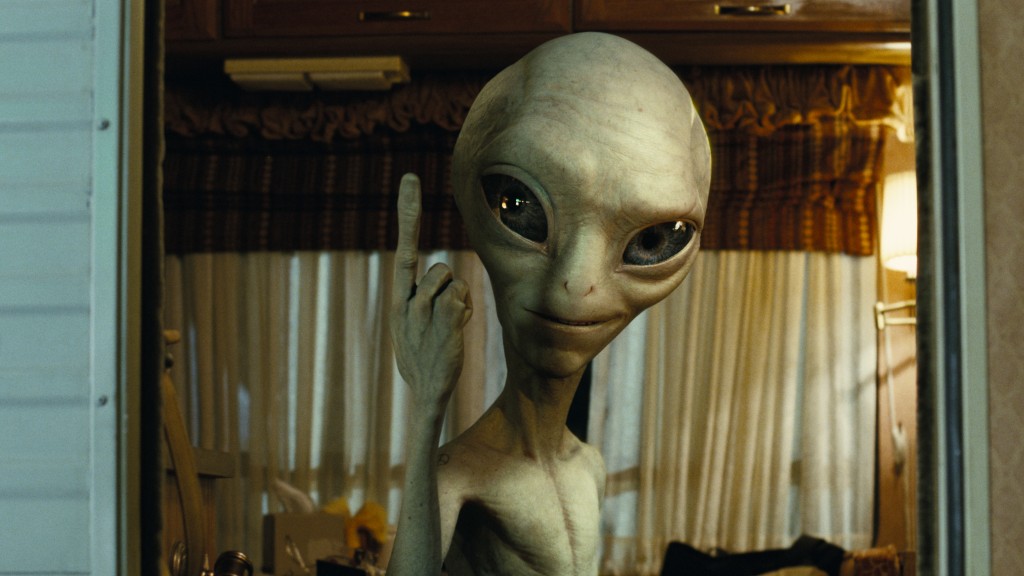In Space, No One Can Hear You Shrug, by David Bax
A person who critiques films, whether for a living or just for some attention on the internet, should try to avoid, out of a sense of ethics and professionalism, getting her or his hopes up for a movie before seeing it. But, with the pedigree that went into the new film Paul, it would have been hard not to assume we were in for something good. The film is written by and stars two people who have been involved with some of the funniest and smartest film comedies of the last ten years (Shaun of the Dead, Hot Fuzz), Nick Frost and Simon Pegg. It’s directed by Greg Mottola, a man whose recent work has been heartbreakingly nuanced in its view of the soul of the young male while never being anything less than gasping-for-breath hilarious (Superbad, Adventureland). And the film is filled out by a stellar cast of both comedy champs (Kristen Wiig, Bill Hader, Joe Lo Truglio, etc.) and stalwart character actors (Sigourney Weaver, John Carroll Lynch, Jeffrey Tambor, etc.). All this is to say that even a jaded soul such as mine was notably disappointed by just how lackluster and mediocre Paul is.
The film starts out with a great deal of promise. The opening scenes (and a few more to follow) are a bit of a love letter to San Diego Comic-Con, the yearly international gathering where geeks of every stripe come to mingle with their own, turning the city’s convention center and environs into a large town of their own. Comic-Con, apart from the cynical corporate presence, truly does remain a place where the nerdy can escape from their lives as social misfits and exist for a few days in a world that not only accepts but celebrates them. It’s this sense of belonging, established early on, that gives Paul what little emotional heft it has.
There’s a theme that doesn’t so much run through the movie as pop up from time to time about finding a place where you belong and the inability to be comfortable or true to yourself when you’re not there. Clive and Graeme, played by Frost and Pegg, respectively, are outsiders in almost every situation. The film never makes fun of them for this but seeks to sympathize, paying close attention to details ranging from ongoing arguments among nerd friends about science-fiction minutiae to the way these two clearly haven’t altered their hairstyles since becoming adults. The rest of the movie’s main character are, in their own way, also strangers, aliens if you will, to mainstream society. There are rookie FBI agents looking for a way in; people with fringe beliefs ranging from religious extremism to conspiracy theorists; and, of course, there is the truest outsider, an extraterrestrial.
The movie’s downfall seems to stem from the fact that disparate personalities of the characters are reflecting in those making the movie. Frost and Pegg couched their buddy-bonding story in post-modernism and genre parody while Mottola is trafficking in his own loose, naturalist approach to established genres. Meanwhile the cast, with their varying comedic and theatrical backgrounds, are often playing different notes, even within the same scene. In adherence to the auteur theory, I will happily place most of the blame on Mottola. But the screenplay here suffers from a lack of cohesiveness as well. Besides the main point about belonging, there are a few other themes crammed in here wherever they can fit. Some of them are handled well, like how America is simultaneously a land of beauty and of terror when viewed from an outsider’s perspective. Others are dealt with in an embarrassingly clunky fashion. Kristen Wiig’s evangelical Christian character, with her constant diatribes, apropos of nothing, about the age of the earth and intelligent design, completely derails the film in her early scenes, before her inevitable conversion at the hands of Paul. There’s at least one other looming factor, though, apart from the cast and crew, that undoubtedly led to the movie’s undoing. Paul is a much bigger-budgeted film than any of those mentioned in the first paragraph and, as such, was likely under much closer scrutiny. The hand of the studio is practically visible here, softening the movie’s edges and dragging it toward the middle of the road whenever possible.
Maybe the it was the studio’s mandate, as well, that the film be rushed through production and post-production. A little more time (which of course means more money) may have done wonders. There are scenes that need a hatchet taken to them. They go on too long without ever being funny. In fact, they become awkward both in themselves and in the way they affect the pacing of the whole story. And there are multiple line readings in the movie that made me think, “That was the best take you got?”
Whatever it was that happened here, it remains far more of a disappointment than the average mediocre studio comedy. Given how many of the people involved have been responsible for films that have raised the bar on what can be said and done within a comedic film, in terms of character, theme and humor, it’s hard to call Paul anything but a wasted opportunity.































This is disappointing news. I wondered how Pegg and Frost would fare without the third leg of the triumvirate, Edgar Wright. I haven’t seen ‘Scott Pilgrim’ yet, but if it’s as good as you and Tyler made it out to be on the podcast, I doubt I’ll be disappointed. I’ll still be seeing ‘Paul’ this weekend, but I’m looking forward to it just a little less now.